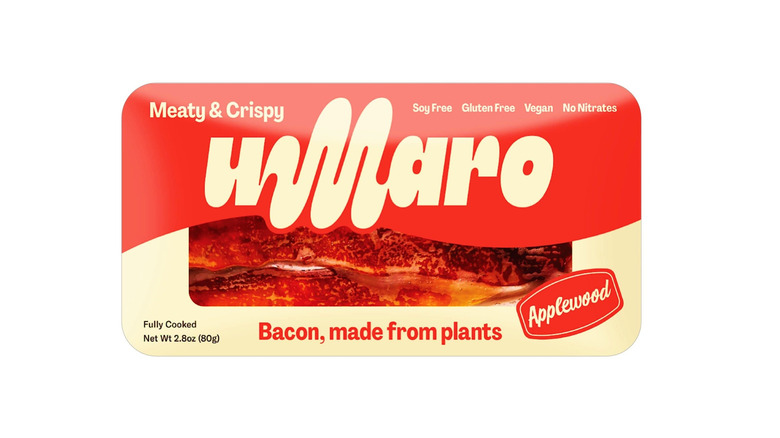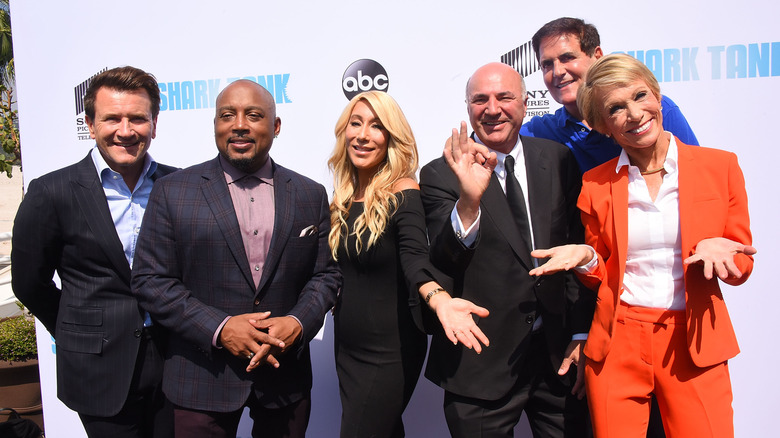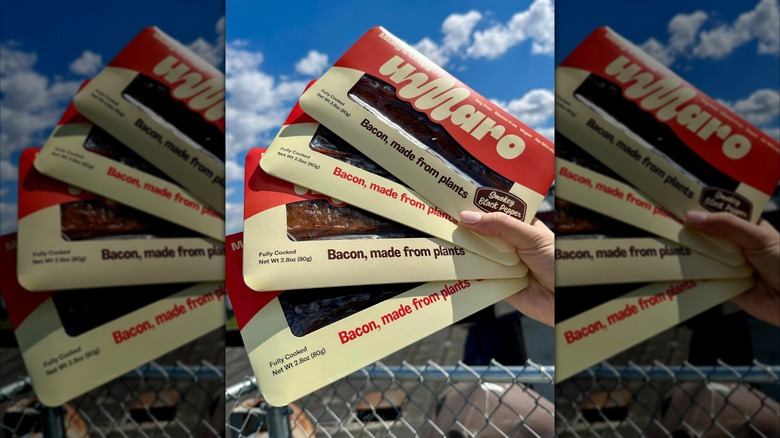Umaro Foods: Here's What Happened After Appearing On Shark Tank
Plant-based food alternatives have been trending for years, with products like the Impossible Burger and vegan Just Egg calling more American kitchens home than ever. Still, not everyone is on board with faux meat. The biggest hurdle for companies is getting it to taste like animal protein. After receiving a grant from the U.S. Department of Energy to research how seaweed could produce biofuels, Beth Zotter had an idea. Although making fuel from the plant wasn't going to be profitable anytime soon, she discovered another way seaweed could help the environment: by becoming bacon.
Meat-free bacon products aren't necessarily new (for example, artificial bacon bits don't generally contain any pork), but Zotter was onto something potentially revolutionary. The term "umami" was actually coined after researchers noticed that seaweed had a natural savory taste. It also has a significant amount of protein. Zotter teamed up with Amanda Stiles, who has a PhD in plant biochemistry, to figure out how to take those elements from seaweed and transform them into a planet-friendly breakfast staple that mimicked the real deal.
Once the duo had created a bacon substitute they deemed worthy of going to market, they needed start-up capital to make that dream come true. ABC's "Shark Tank" was a perfect place to start. They went in swinging for the fences with a $25 million valuation of their business, which, at the time, had not yet launched. As if that weren't bad enough, shark Robert Herjavec spit the product out after trying it, making the situation look dire for Zotter and Stiles' company, Umaro Foods.
What happened to Umaro Foods on Shark Tank?
When the Umaro Foods founders entered the tank asking for $500,000 in return for a measly 2% equity stake in the company, the investors were noticeably taken aback. Yet, Zotter hammered on the fact that the fledgling business had applied for multiple patents, including one related to the separation process that made it possible to extract protein from seaweed. Despite Herjavec's initial reaction to the taste, he and the other sharks found it to be close to bona fide bacon when put in a sandwich, and Zotter and Stiles were convincing enough in their pitch to get offers.
Although Herjavec changed his tune once he tried the plant-based bacon on a BLT, the $25 million valuation still was something he couldn't swallow and he bowed out. Guest shark Emma Grede quickly jumped ship for the same reason. Kevin O'Leary saw promise in the faux meat but countered the founders' steep ask by asking for 8% equity. When they shot back with an ask for $1 million for the 8%, O'Leary didn't have time to respond before Mark Cuban dove in and said, "I'll do that deal," (via Sony Pictures Television).
Lori Greiner was still interested, talking over Cuban and saying, "I want to be on this journey with you really, really badly." She offered $500,000 for 4%, contingent on her equity not being diluted in the next round of fundraising. After a short discussion with Stiles, Zotter asks Cuban if he would go to 7%. He mulled the idea over and said, "Yeah," which prompted Zotter to take the deal.
Umaro Foods After Shark Tank
Following their "Shark Tank" appearance, Zotter and Stiles hit the ground running. Only months after the show aired in April 2022, Umaro Foods' seaweed bacon was sold in dozens of restaurants across the country. New York's hit breakfast haunt, Egg Shop, offered customers the plant-based alternative, while even San Francisco's Michelin-starred restaurant Sorrel was getting in on the trend. However, Umaro Foods had room to grow.
Zotter envisioned the next step in the company's future in retail, planning to launch the product into stores on the West Coast. However, initial investor Mark Cuban may not have had a hand in any of this, as there has been no indication that he is part of the business from Umaro Foods' social media. The company is likewise not featured on Cuban's website, which lists the companies he is involved with.
Obtaining a deal with a shark on the program doesn't guarantee that everything gets hammered out to all parties' expectations. Consider how Beyond Sushi secured a deal on "Shark Tank" with Lori Greiner and guest shark Matt Higgins but never closed on it. Still, there are plenty of fish in the sea, and Umaro Foods found other ways to procure funding for a retail expansion.
Is Umaro Foods still in business?
With company expansion in mind, Umaro Foods set out to raise more capital. One initial investor, AgFunder, spearheaded this effort, bringing in millions of dollars of investment funds. Perhaps more importantly, the business found an investor in Chris Paul, an NBA All-Star who switched to a vegan diet in 2018. With cash in hand and a celebrity sports star backing the product, Umaro Foods soon found its way into retail locations on the West and East Coast.
Today, most people can get the faux bacon delivered to their door via Amazon (superfans can even order it in bulk from WebstaurantStore). If you live in California, you can buy it at a Whole Foods market on your next grocery run. Folks residing in Maryland can get their hands on the plant-based breakfast food by visiting Roots Market, an independent and locally owned grocery store with a focus on all-natural and organic products. Umaro Foods has also gotten more restaurants on board, with roughly 250 featuring its seaweed bacon on the menu.
What's next for Umaro Foods?
Umaro Foods has succeeded in getting a foothold in the meat-alternative market, and there is currently no indication the company is slowing down. However, despite taking the faux meat world by storm, Umaro Foods may still be balancing its books. The company is currently focusing on streamlining its automation process and securing more customers so costs go down and profits rise.
Along with bacon, Zotter mentioned during her appearance on "Shark Tank" that she would like to expand into making non-meat salami, pepperoni, and other cured proteins. As of now, Umaro Foods has released plant-made bacon, egg, and cheese sandwiches. The company has plenty of competition in the vegan meat sector. It will be interesting to see in the coming years if Umaro Foods becomes a dominant force in plant-based proteins or if the founders receive a sizeable payout from a larger business that wants to include the brand in its portfolio.




